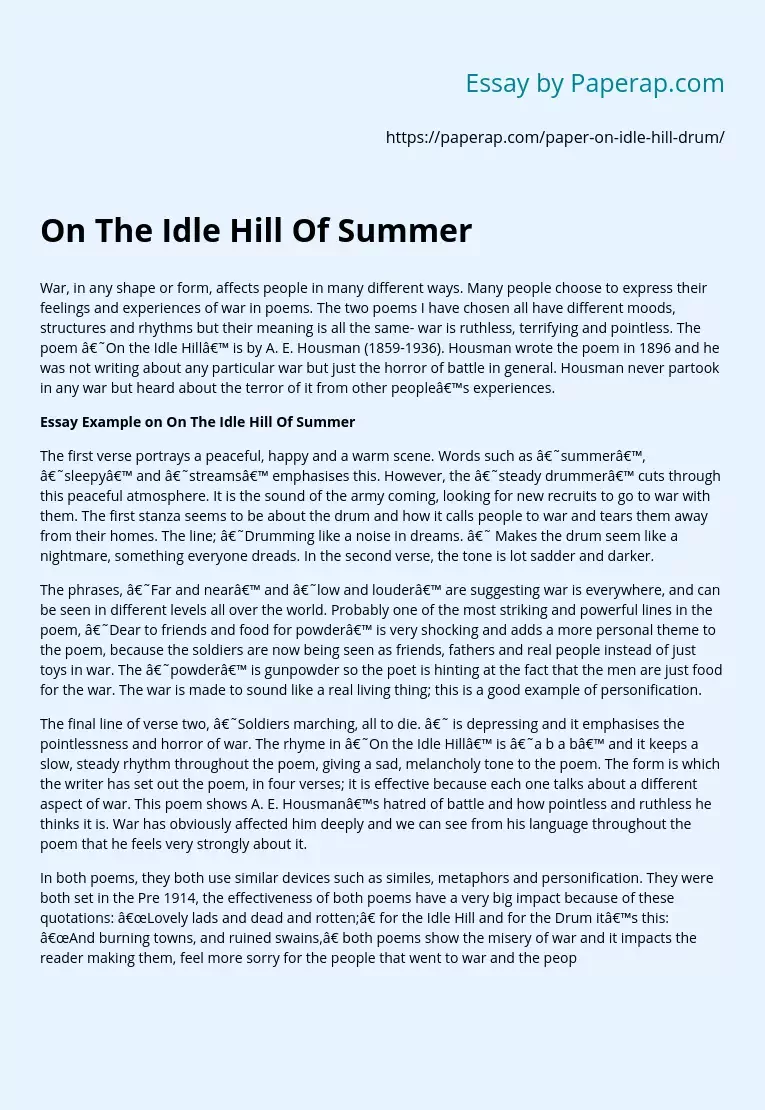War, in any shape or form, affects people in many different ways. Many people choose to express their feelings and experiences of war in poems. The two poems I have chosen all have different moods, structures and rhythms but their meaning is all the same- war is ruthless, terrifying and pointless. The poem ‘On the Idle Hill’ is by A. E. Housman (1859-1936). Housman wrote the poem in 1896 and he was not writing about any particular war but just the horror of battle in general.
Housman never partook in any war but heard about the terror of it from other people’s experiences.
Essay Example on On The Idle Hill Of Summer
The first verse portrays a peaceful, happy and a warm scene. Words such as ‘summer’, ‘sleepy’ and ‘streams’ emphasises this. However, the ‘steady drummer’ cuts through this peaceful atmosphere. It is the sound of the army coming, looking for new recruits to go to war with them. The first stanza seems to be about the drum and how it calls people to war and tears them away from their homes.
The line; ‘Drumming like a noise in dreams. ‘ Makes the drum seem like a nightmare, something everyone dreads. In the second verse, the tone is lot sadder and darker.
The phrases, ‘Far and near’ and ‘low and louder’ are suggesting war is everywhere, and can be seen in different levels all over the world. Probably one of the most striking and powerful lines in the poem, ‘Dear to friends and food for powder’ is very shocking and adds a more personal theme to the poem, because the soldiers are now being seen as friends, fathers and real people instead of just toys in war.
The ‘powder’ is gunpowder so the poet is hinting at the fact that the men are just food for the war. The war is made to sound like a real living thing; this is a good example of personification.
The final line of verse two, ‘Soldiers marching, all to die. ‘ is depressing and it emphasises the pointlessness and horror of war. The rhyme in ‘On the Idle Hill’ is ‘a b a b’ and it keeps a slow, steady rhythm throughout the poem, giving a sad, melancholy tone to the poem. The form is which the writer has set out the poem, in four verses; it is effective because each one talks about a different aspect of war. This poem shows A. E. Housman’s hatred of battle and how pointless and ruthless he thinks it is. War has obviously affected him deeply and we can see from his language throughout the poem that he feels very strongly about it.
In both poems, they both use similar devices such as similes, metaphors and personification. They were both set in the Pre 1914, the effectiveness of both poems have a very big impact because of these quotations: “Lovely lads and dead and rotten;” for the Idle Hill and for the Drum it’s this: “And burning towns, and ruined swains,” both poems show the misery of war and it impacts the reader making them, feel more sorry for the people that went to war and the people will think war is not patriotic but it’s unpatriotic. The cultural and social background for ‘Drum’ and ‘Idle Hill’ are between wars.
On The Idle Hill Of Summer. (2019, Nov 27). Retrieved from https://paperap.com/paper-on-idle-hill-drum/

